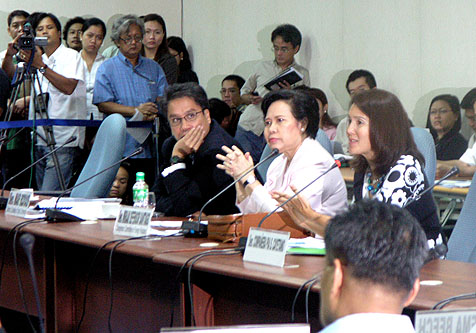Roxas on JPEPA: No deal better than bad deal
ABS-CBN | 4 October 2007
Roxas on JPEPA: No deal better than bad deal
Sen. Mar Roxas on Thursday said senators remain unconvinced on ratifying the Japan-Philippines Economic Partnership Agreement (JPEPA) even as the executive branch had created an inter-agency task force to explain to senators the benefits of the bilateral economic agreement.
"In trade negotiations, no deal is always better than a bad deal. The challenge remains for our trade negotiators to show us—in specific, concrete terms—how this agreement will redound to the benefit of our people," said Roxas.
Roxas said that even with four hearings already conducted by the Senate "the government’s presentation to the Senate is inconclusive. The ‘gives & takes’ remain unclear."
The Senate Trade and Commerce committee chairman said that the so-called benefits asserted by the executive branch have been countered by groups opposed to ratification of JPEPA.
"For example, the government asserts that JPEPA will lead to the hiring of Filipino nurses, yet the oppositors have singled-out specific chapter and verse in the agreement which says our nurses will be on OJT ("on the job training") status."
"The government says that our health workers will be accorded ‘national treatment,’ or granted the same rights and privileges as Japanese nationals. However, no one could answer whether Filipino nurses will receive exactly the same benefits—monetary or otherwise—or protection as Japanese nurses," said Roxas.
Roxas maintained that he still keeps an open mind on JPEPA due to his recognition of the strong bilateral relationship between the Philippines and Japan.
The challenge he said however is on the newly-created presidential task force on JPEPA which was formed by Malacañang to convince senators.
Malacañang in a statement on Wednesday announced the creation of an inter-agency task force that will provide the Senate with "the needed inputs on the benefits, advantages and opportunities the Philippines stands to benefit from the ratification of the Japan-Philippines Economic Partnership Agreement (JPEPA)."
Administrative Order (AO) No. 198, signed by President Arroyo on Sept. 28 stated that the Inter-Agency Task Force for the JPEPA Senate Ratification will work for JPEPA’s ratification by the Senate.
The task force was said to be composed of representatives from 18 government agencies, including 15 executive departments. These are the Departments of Foreign Affairs; Trade and Industry; Agriculture; Budget and Management; Education; Energy; Environment and Natural Resources; Finance; Health; Justice; Labor and Employment; Public Works and Highways; Science and Technology; Tourism; Transportation and Communications; National Economic and Development Authority; Bangko Sentral ng Pilipinas, and Securities and Exchange Commission.
In an earlier administrative order, the President created the Philippine Coordinating Committee (PCC) to study the feasibility of the JPEPA. The PCC, which was also composed of the 18 government agencies, contributed its "time and effort to the successful negotiation of the JPEPA and concurred to the ratification of the treaty."
Senate President Manuel Villar on Tuesday said that Japan’s free-trade deal with the Philippines is unlikely to be ratified by the Senate in its present form.
The JPEPA, signed in September last year, would remove import tariffs on more than 90 percent of goods traded between the two Asian countries, and opens the largely closed Japanese labor market to Filipino health workers.
The agreement can not come into effect until it is ratified by the Senate where it has been held up amid claims from vested interest groups that it is one sided in favor of Japan.
President Arroyo has described the agreement as a one of the economic priorities of her government.
"Personally I’m not impressed with the so-called economic benefits," Villar told the Foreign Correspondents Association at a forum.
Nevertheless, he said he kept an open mind and "I’m still waiting for them (Philippine economic officials) to convince me."
Villar, widely seen as a likely candidate in the May 2010 presidential election, said officials sent by the government to hearings on the deal "have been unable to convince the senators that it is beneficial to the country."
He said environmentalist groups, who are campaigning against the treaty allegedly because it would allow Tokyo to dump hazardous wastes in the Philippines disguised as exports, "are better at presenting their case."
Villar said he favored a renegotiation of the agreement, one of a raft of bilateral or regional free trade agreements being negotiated or signed by Asian countries amid a breakdown in the Doha round of the World Trade Organization talks.
With a report from AFP






